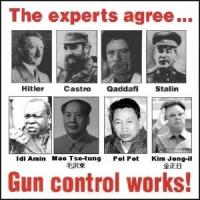 There is an organization called DownsizeDC.org that is sponsoring a “Read the Bills Act.” This piece of legislation would require that congress actually read a bill before they vote on it.
There is an organization called DownsizeDC.org that is sponsoring a “Read the Bills Act.” This piece of legislation would require that congress actually read a bill before they vote on it.
That’s right – a “law” requiring that “lawmakers” actually read what they’re voting on before they make it “law.”*
Does this sound ridiculous and unnecessary? I mean, of course they actually read the bills before they vote on them, right? Actually, no, they don’t. The so-called PATRIOT act was 315 pages long, and the cockroaches in congress received their copy for review only 15 minutes before the vote. If you watch Andrew Napolitano’s speech at FFF.org (I’ll start you at part III to hear his bit on the PATRIOT act, but the whole thing is good…) you’ll learn that a judge reviewed the legislation himself, and that it took him two days to do so.
Imperial Senator John Conyers, Jr. (S**-Michigan) said “We don’t really read most of the bills. Do you know what that would entail if we read every bill that we passed?”
As pawns in government’s game, we’re often told that “ignorance of the law is no excuse.” This means that you are responsible to understand the federal register, which grows at the rate of 200 – 600 pages a day (which, if you spent 20 hours a day reading, you could keep up with the legislation passed each year…) But the “lawmakers” read almost none of it.
OK, so I’ve made the case for the Read the Bills Act. Obviously, if the Great Leaders expect us to follow all of this “law,” certainly, they should have to read it first and understand exactly what they are imposing on us. That seems logical.
In the first chapter of For a New Liberty, Murray N. Rothbard describes utilitarianism as a compromise of principle for the sake of political expediency. Applied to this scenario, it means that instead of striking at the root of the problem (the idea of government and “lawmakers” creating rules over the rest of us in the first place) we take a pragmatic approach, attempting to force them to actually read bills before they pass them. It is an approach based on “playing within the rules” to accomplish change.
The Read the Bills Act is an attempt to slow the growth of legislation through legislation. It will be an absolute failure, of course, but the effort itself is nothing more than begging your masters to lighten the stroke of the whip.
The principled stance is to assert that none of this legislation is valid, and that the institution imposing it on the people is illegitimate. But that is a radical approach, one that is too “unrealistic” to utilitarians. A utilitarian accepts the rules of the game, and tries to play within them. They never win, and we always lose when we buy into their philosophy.
Utilitarianism has never accomplished one thing for liberty.
Liberty has always been the product of a tireless minority, radicals who refuse to accept the status quo of the state and its presumed leaders. Liberty and the state are incompatible, and humanity will move forward when this contradiction is resolved. It will not be accomplished by working within the rules of the “system.”
*I use the term “law” in quotation marks because nothing that government does has anything to do with the pure definition of law. My definition of law comes from Frederic Bastiat’s essay The Law (audio here), which states that the proper role of law is to protect life, liberty, and property. Anything posing as “law” that not only fails to protect life, liberty, or property, but actually imposes on them, is not law at all, but is an instrument of plunder. It is man-made legislation that is anti-law.
**S is for Scumbag, “D’s” and “R’s” are irrelevant in the House of Thieves.




